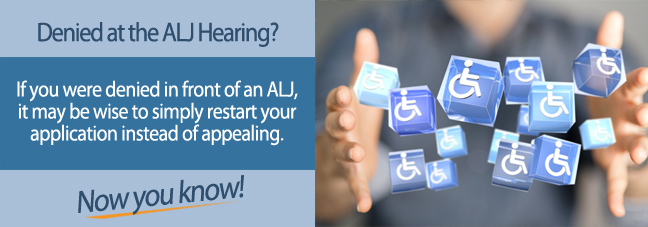Disability benefits from the Social Security Administration (SSA) are intended to provide essential financial support for disabled Americans of all ages. Unfortunately, getting benefits can be a long and cumbersome process for some applicants.
If you can get approved though, disability offers consistent income, taking the place of your decreased or lost income from employment.
The Appeals Hearing with an Administrative Law Judge
Once a disability claim has been denied at both the initial and reconsideration stages, an appeal hearing is the next step. An administrative law judge (ALJ) presides at the hearing, and he or she reviews your entire claim in addition to any new evidence you present prior to the hearing or during your testimony.
The ALJ ultimately makes the determination on your eligibility for disability benefits.
The appeals hearing decision depends on the merits of your case, the evidence you have, and to a certain extent, on the judge that reviews your claim. Although all judges are tasked with approving or denying claims based on disability program rules, some judges do have higher approval rates than others.
Expert testimony can influence the outcome of your appeal. Having a disability attorney or advocate on your side can make a difference as well. However, an ALJ hearing can go either way, resulting in an approval, finally, or just another denial.
Denial and Approval Rates
Appeal hearing approval rates have averaged at nearly 50 percent nationwide in recent years, but denials are becoming more common. This is because the SSA has been keeping a closer watch on whether all judges are applying eligibility rules consistently.
Even with the increased attention though, approval rates remain relatively high at the appeals hearing stage.
What to do if You’re Denied Disability Benefits
If you are denied disability by an ALJ, you can continue to fight for benefits, though you must understand that the next appeal stage often takes months. In addition to a long wait, you won’t have the chance to present new evidence or provide additional testimony. Instead, your claim is forwarded on to the Appeals Council for review.
A disability attorney or advocate cannot only potentially increase your chances of winning an ALJ hearing, but can also assist you as you move forward after a denial. An advocate or attorney can check the status of your claim and push to get your appeal through the Council’s review processes as quickly as possible.
Since this process can take a long time, your advocate or attorney may also advise and assist you in filing a new disability application, even before you receive a decision from the Appeals Council. This is especially true if your disability worsens or you have significant, new medical evidence with which to argue eligibility for disability benefits.
